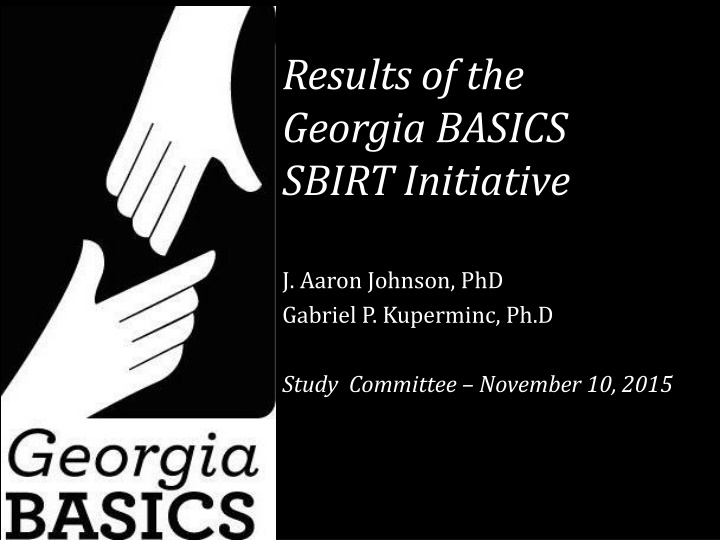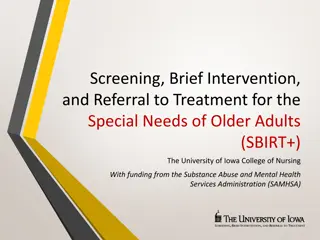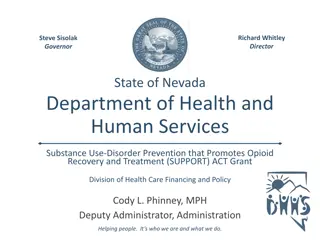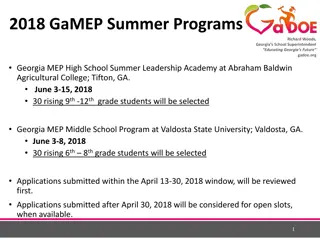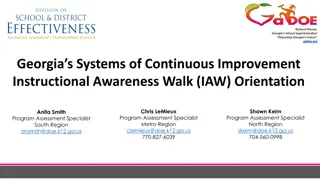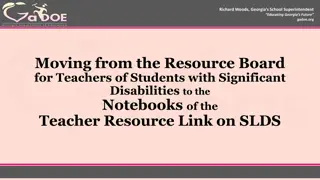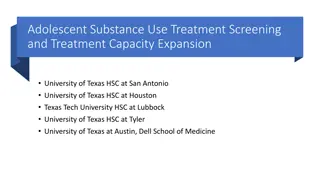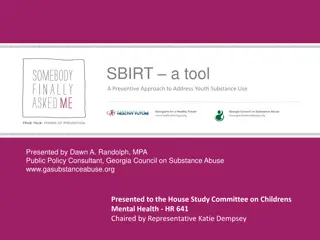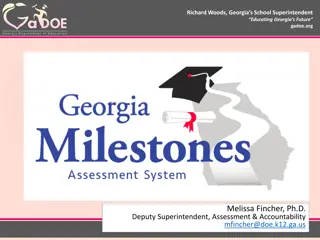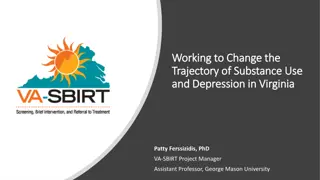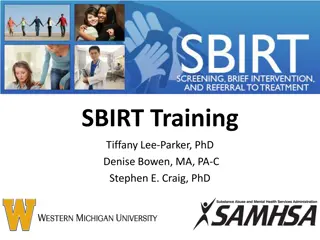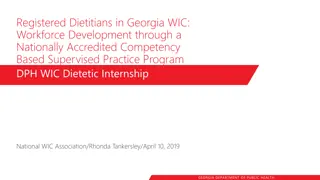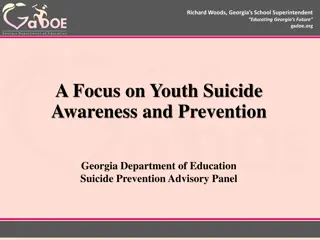Georgia BASICS SBIRT Initiative Results and Findings
The Georgia BASICS SBIRT Initiative focused on implementing universal screening and providing brief intervention using Motivational Interviewing in urban emergency departments to address health concerns linked with behaviors like alcohol and drug use. The study included services provided, patient enrollment, and evaluation of the intervention group compared to the control group, indicating promising outcomes in terms of education levels, employment status, and housing stability among participants. The initiative aimed to shift the focus from blaming patients for poor choices to motivating them towards positive choices.
Download Presentation

Please find below an Image/Link to download the presentation.
The content on the website is provided AS IS for your information and personal use only. It may not be sold, licensed, or shared on other websites without obtaining consent from the author.If you encounter any issues during the download, it is possible that the publisher has removed the file from their server.
You are allowed to download the files provided on this website for personal or commercial use, subject to the condition that they are used lawfully. All files are the property of their respective owners.
The content on the website is provided AS IS for your information and personal use only. It may not be sold, licensed, or shared on other websites without obtaining consent from the author.
E N D
Presentation Transcript
Results of the Georgia BASICS SBIRT Initiative J. Aaron Johnson, PhD Gabriel P. Kuperminc, Ph.D Study Committee November 10, 2015
Georgia BASICS SBIRT Demonstration Project Implement universal screening in Emergency Departments Provide Brief Intervention using Motivational Interviewing technique Additional in-house therapy, referral to treatment Settings Grady Health System (Atlanta) Medical Center of Central Georgia (Macon)
Urban Emergency Patients Risk Poverty, housing instability Lack consistent health care, unmet needs Behaviors (e.g., alcohol, drug use) linked with health concerns ED visit as Teachable Moment Opportunity to help patients make the connection Change from blame for poor choices to increased motivation for positive choices
Patient Enters ED BI = Brief Intervention BT = Brief Therapy RT = Referral to Treatment Nurse Brief Prescreen: 25% Pos. Positive Prescreens receive ASSIST Full Screen 32% Screening Feedback Health Educators 7% Very High Risk BI+ RT 54% Low- Moderate Risk BI 7% High Risk BI + BT 10% Sample enrolled For 6 month Follow Up
Georgia BASICS: Services Provided Services Provided 154,429 21,193 2,790 3,176 181,588 Screening/Feedback Brief Intervention (BI) BI + Brief Therapy (BT) BI + Referral to Tx (RT) Total
Evaluation Screening: Identify Pts. Eligible for Services Brief Intervention Brief Therapy Referral to Treatment 6-Month Follow Up INTERVENTION GROUP x COMPARISON GROUP x x x 0 x
Study Sample Comparison Group (N = 1737) 11.77 42 34% 74% 33% 49% $807 SBIRT Group ( N =1170) Years of Education Average Age Female African-American Employed Full or Part Time Unstably housed/Homeless Average Monthly Wage 11.80 42 29% 74% 33% 48% $571 Notes: (1) SBIRT pts enrolled in study via random selection from those receiving services. (2) Control pts received screening/assessment but no services. (3) 6-month follow-ups completed w/ 50% of Control and 65% of SBIRT pts.
Intervention group decreased Substance Use Baseline to 6-mo Follow-up 12 10 8 6 4 2 0 Alcohol Any Drugs Marijuana Cocaine Baseline Follow-Up
Greater Decreases in Binge Drinking for SBIRT vs. Control Patients 100% 92% 90% 80% 74% 70% 58% 58% 60% 50% 40% 30% 20% 10% 0% SBIRT Control
Mental Health Improvements in Quality of Life 50 48 46 44 42 40 38 36 34 32 30 SBIRT Comparison Baseline 6-Month
Conclusions REDUCED Alcohol and other Drug use Similar to findings in other SBIRT studies Tend to be Larger for SBIRT vs. Comparison Better Evidence for Effectiveness with Alcohol than other Drugs MORE THAN SUBSTANCE USE Improved Mental Health may mark greater sense of control, help individuals choose to reduce use of substances
Thanks to SAMHSA, #TI019545 GA Div. Behavioral Health & Developmental Disabilities GSU Colleagues and Students Grady Health System & Medical Center of Central Georgia For more information, contact: J. Aaron Johnson Aaron.Johnson@gru.edu Gabriel Kuperminc gkuperminc@gsu.edu
